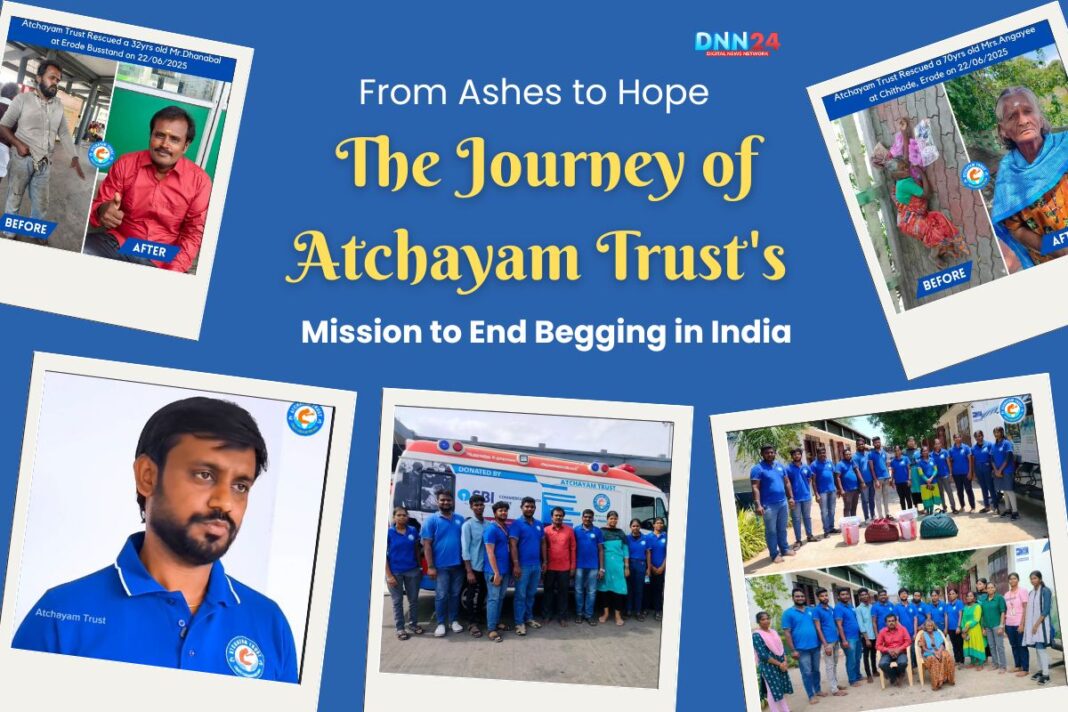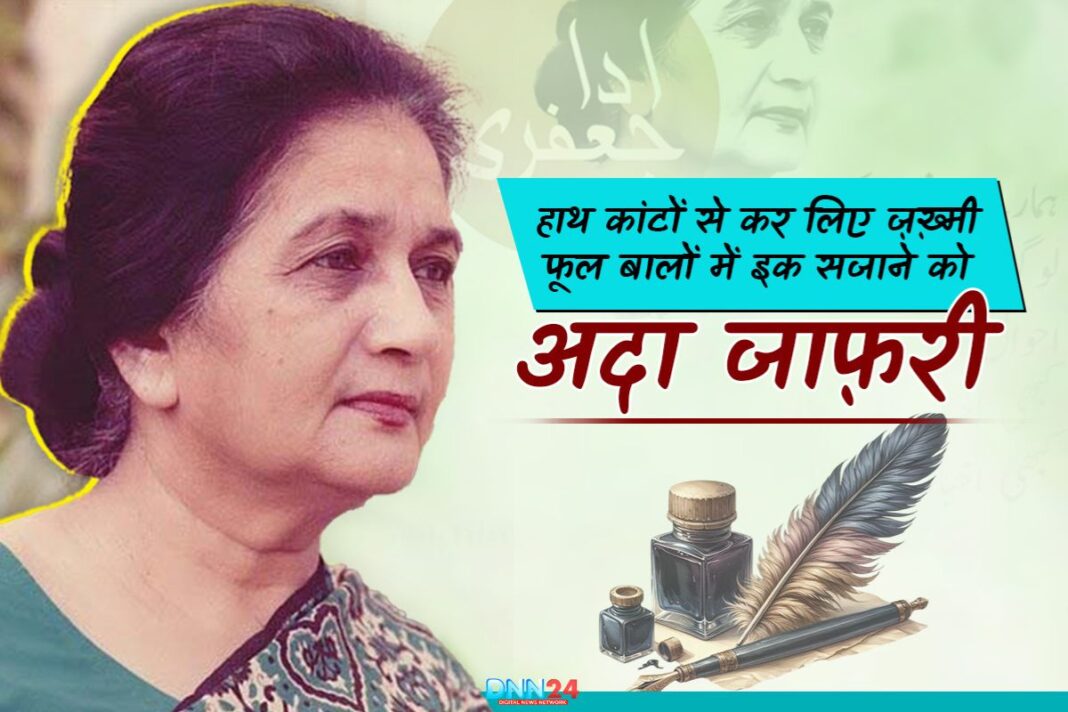Millions of people rush past the people who live in the shadows in every part of India—men and women whose only occupation is begging and whose only home is the pavement. However, these shadows were never invisible to P. Naveenkumar, the founder of Atchayam Trust. His grandmother raised Naveen in a small Tiruchy village, where he experienced adversity. Every day was a struggle for survival because of his mother’s severe arthritis and his father’s disability.
Naveen cleared cowsheds for hours before and after school, earning a pitiful Rs. 4 for each job completed, and even as a young boy, he wiped tears and sweat in the fields for a miserable wage. During those difficult times, however, the seeds of empathy took root instead of bitterness. As Naveen observed his parents’ unspoken fortitude, he realised that the world ignores the weakest people—not because they are cruel, but because of habitual blindness. He decided to help someday, so that a whole country could see the people it had forgotten.
The Meeting That Revolutionised Everything
Everybody has a pivotal moment when they ask themselves, “Why doesn’t someone help?” and then ask themselves, “Why not me?” It was a fortuitous meeting at a bus stop for Naveenkumar. He saw an older man shivering beneath a broken shelter, pleading for alms, late one evening as rain streaked through flickering lights. For most people, this is a scene to be disregarded or briefly pitied. The picture left a lasting impression on Naveen.
He could not sleep that night because he kept thinking about the man’s fate. When Naveen returned the following morning, he brought food and a promise instead of just money. One young man’s empathy turned into a lifelong commitment, marking the first unofficial rescue of Atchayam Trust. The path to an India free of beggars started in that moment.
Building a Movement from Scratch: Inspiring Friends to Action
What happens if a lone dream finds like-minded people? Naveen’s mission was viewed with suspicion and even derision during college. Classmates would ask, “Why waste your youth helping those who cannot repay you?” He did see, however, what they had overlooked: the unrealised potential within every willing heart. In addition to bringing food and friendly conversation to people experiencing homelessness, Naveen invited friends to accompany him on nighttime walks.
College students’ combined rupees, their leftover lunchboxes, and their impressionable youth served as the Trust’s initial resources. Their kindness became infectious over time. Volunteers’ doubts vanished as they witnessed lives being put back together and lost smiles returning; they were replaced by a sense of purpose that no campus festival could match. As a result, Atchayam’s core volunteer family was formed through shared struggle rather than comfort.
Atchayam Trust- The Struggle Against Stigma: Fighting for Acceptance
Every movement has its mountain, and Atchayam’s was the antagonistic apathy of society. “This is not your problem,” the authorities cautioned Naveen. Fearing the introduction of “beggar homes,” the locals complained. The hearts of those he attempted to assist, whose Trust had been broken by years of rejection, were perhaps the hardest. Out of mistrust and embarrassment, many turned away aid, refusing to take refuge or receive assistance.
Naveen Kumar discovered how to fight against the unseen bonds of stigma in addition to hunger. Day after day, he and his team continued to show up with food, clean clothes, baths, kind words, and boundless patience. They gradually gained the favour of even the most cynical people by treating everyone with dignity. Neighbours eventually became supporters, and government representatives acknowledged the movement’s sincerity.
Atchayam Trust: The Significance of Training and Rehabilitation
Because survival isn’t the same as living, Atchayam Trust’s work never ends with a full stomach or a safe bed. According to Naveen Kumar, dignity cannot be restored aimlessly. The Trust helps people excluded from society for too long to become self-sufficient by providing skill development in areas such as gardening, tailoring, incense and paper bag making, and more. Training is about more than just jobs; it’s about regaining self-esteem, ending the silence of loneliness, and providing invisible support to struggling people. During this process, every rescued soul is reminded that they are capable and not victims. True transformation and the end of begging can only start at that point.
Stories That Light the Darkest Hours
When Naveen’s path gets tough, he thinks of the people whose lives have paved the way. Consider Mr. Venkatraman, who was formerly lost to alcoholism and poverty but is now Atchayam’s most reliable cook. His smile is as warm as the food he serves to others. Or Jayalakshmi, a mentally ill Sri Lankan refugee who now fosters abandoned children in a care facility in return for the kindness she experienced. These tales serve as potent reminders that every life, no matter how broken, has the capacity for resurrection amid innumerable recoveries and reunions. Atchayam is led through heartbreaks and setbacks by each victory, like a candle in the dark.
Dignity First: The Healing Power of Personal Touch
The emphasis on dignity in Atchayam Trust’s strategy sets it apart. Before anyone is allowed into their homes, they must provide the necessities that many people take for granted, such as a bath, a haircut, clean clothes, and a polite greeting. It is a tiny act that has a huge impact, wiping out the months or years of embarrassment that come with begging. This is brotherhood, not charity. Atchayam sows the first seeds of healing by beginning with the restoration of appearance and self-worth. Only then do skill training, medical care, and counselling take hold. In Naveen Kumar’s opinion, these intimate touches are the difference between momentary solace and the restoration of hope.
Youth Power: Volunteers as the Heartbeat
The accomplishments of Atchayam Trust are not solely the product of one individual. Unstoppable energy and limitless creativity are brought to the cause by volunteers, many of whom are still in their teens or early twenties. They oversee rescue operations, conduct skill-building classes and repair records, and offer essential company to those who lack it. Motivated by a sense of purpose and belonging, these young change-makers go beyond being merely volunteers to become the core of Atchayam’s mission.
Through their service, they learn something that textbooks never teach: true success is determined by the lives one touches rather than by grades. As they develop into professionals and leaders, they spread the values of Atchayam throughout India by bringing them to every community they join.
Coping with Loss: Bearing the Emotional Burden
Despite its benefits, social change is a journey fraught with heartache. Seeing rescued people revert to their old habits, cut off from communication, or prove impossible to reach by any means is a common source of pain for Naveen and his team. Every loss is profound, particularly when seemingly successful moments are lost to the streets once more. How does one persevere through such setbacks and never give up?
According to Naveenkumar, the fire is maintained by remembering victories—every individual who found hope, made it home, or decided to live rather than give up. This resilience is shared by his team, which encourages one another and views failures as opportunities for greater effort rather than as grounds for giving up.
A Vision of Tomorrow: Dreaming a Beggar-Free India
What does Atchayam Trust’s future hold? Because the need has been eradicated, Naveen envisions a country where the term “beggar” no longer exists. He envisions Atchayam chapters operating in every Indian state in ten years, led by young people from the area, and rehabilitating tens of thousands instead of just hundreds. He sees a new social contract in which helping the weakest members of society is viewed as justice rather than charity. Although the journey is lengthy, each reunited family, skilled artisan, and young volunteer proves the dream is achievable. Naveenkumar says, “Some goals seem too big until you try with all your heart.”
A Message to India’s Youth: Courage Begins with Kindness
Naveen Kumar advises any young person who wants to change the world but feels helpless: “Courage is not the absence of fear, but the act of loving someone more than your hesitation.” Take one step at a time. Talk to just one individual. Be kind, not perfect. He maintains that a willingness to uplift one fellow human being inspires change, not lofty speeches. The Atchayam Trust story illustrates what occurs when a regular man refuses to overlook suffering. If we all had the same courage, think of the India we could create.
Also Read: The Book in Hand Campaign: A Healthy Revolution Through Reading
You can connect with DNN24 on Facebook, Twitter, and Instagram and subscribe to our YouTube channel.



